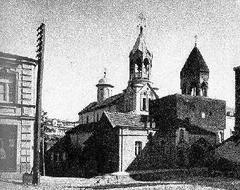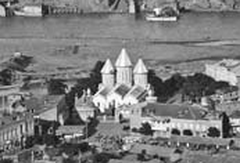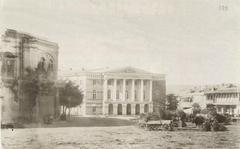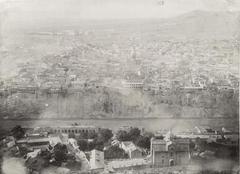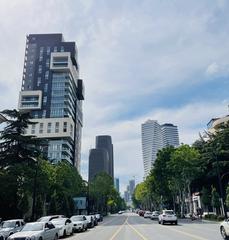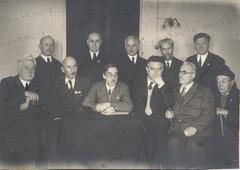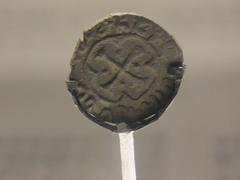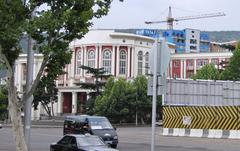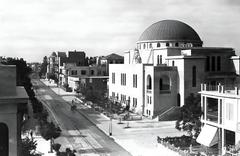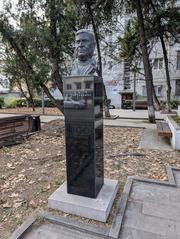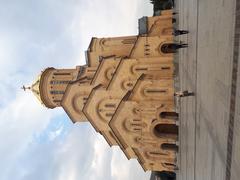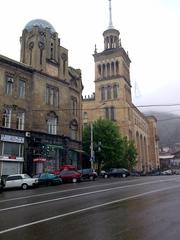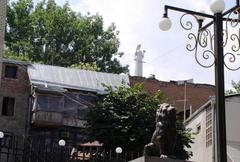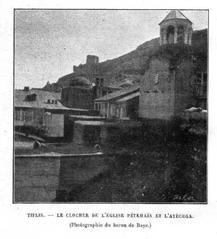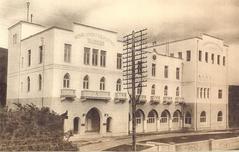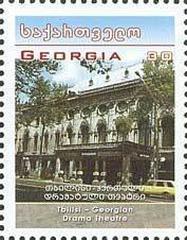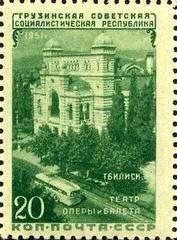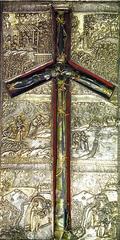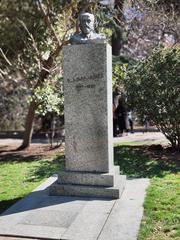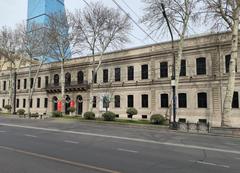Chachava Clinic Visiting Hours, Tickets, and Guide to Tbilisi Historical Sites
Date: 03/07/2025
Introduction
Located in the heart of Tbilisi, Georgia, the Chachava Clinic is a historic institution with a legacy stretching nearly 150 years. Founded in 1875 as the Tbilisi Maternity Hospital and named after Dr. Mikheil Chachava, the clinic has played a transformative role in advancing women’s health and modern obstetric care in the Caucasus. Over the decades, it has evolved from a pioneering maternity hospital to a state-of-the-art center for maternal, neonatal, and reproductive health, attracting both local and international patients (Chachava Clinic Official History).
Beyond its medical excellence, the Chachava Clinic sits near some of Tbilisi’s most cherished cultural and historical landmarks, including Rustaveli Avenue, Freedom Square, and the iconic Narikala Fortress. This guide provides a comprehensive overview of the clinic’s history, practical visitor information, and a curated introduction to nearby attractions, making it an essential resource for patients, professionals, and tourists alike.
Table of Contents
- Founding and Early Years (1875–1917)
- Soviet Era Transformation (1917–1991)
- Post-Soviet Modernization and Expansion (1991–Present)
- Visitor Information: Planning Your Visit to Chachava Clinic
- Cultural and Social Significance
- Contributions to Georgian Medical Science
- Architectural Heritage and Location
- Milestones and Achievements
- Role in Contemporary Georgian Healthcare
- FAQ
- Narikala Fortress: Visitor Guide
- Summary and Key Takeaways
- References and Useful Links
Founding and Early Years (1875–1917)
Established in 1875, Chachava Clinic (then Tbilisi Maternity Hospital) was Georgia’s first modern maternity hospital. Dr. Mikheil Chachava’s vision brought Western medical practices to Georgia, providing formal training for midwives and doctors at a time when childbirth was largely managed by traditional attendants. The clinic’s founding marked a turning point in the institutionalization of maternal care and the professionalization of obstetrics in the region (Chachava Clinic Official History).
Soviet Era Transformation (1917–1991)
With the Sovietization of Georgia, Chachava Clinic was nationalized and integrated into the USSR’s healthcare system, expanding its facilities and services to address maternal and infant mortality. The clinic became a regional center for obstetric research, education, and innovation—contributing to the development of standardized protocols that were later implemented across the Caucasus (Georgia Healthcare Overview).
Post-Soviet Modernization and Expansion (1991–Present)
After Georgia’s independence, Chachava Clinic adapted to a market-oriented healthcare landscape. Despite economic difficulties in the 1990s, the clinic maintained its commitment to excellence, undergoing major modernization in the 21st century. It introduced advanced reproductive technologies, including in vitro fertilization (IVF), and expanded its offerings in neonatology and minimally invasive surgery (Chachava Clinic IVF Services). Today, it is recognized for its modern equipment, expert staff, and patient-centered care.
Visitor Information: Planning Your Visit
Visiting Hours
- Monday to Friday: 8:00 AM – 6:00 PM
- Saturday: 9:00 AM – 2:00 PM
- Sunday: Closed
Entry and Tickets
- As a functioning medical facility, public tours are not standard but can be arranged by request.
- Appointments for medical consultations or treatments are booked through the official website or by phone.
- For historical and architectural tours, contact the clinic administration in advance.
Accessibility
- The clinic is wheelchair accessible, with ramps and elevators.
- On-site parking is available for patients and visitors.
Guided Tours and Events
- Chachava Clinic occasionally hosts medical conferences and public lectures. Check the official site for upcoming events or special guided tours.
Travel Tips
- The clinic’s central location makes it easily reachable by taxi, bus, or metro.
- Combine your visit with a tour of nearby sites such as Rustaveli Avenue, the Tbilisi Opera and Ballet Theatre, and Freedom Square (Tbilisi Tourism Guide).
Cultural and Social Significance
Chachava Clinic is woven into the fabric of Georgian society, serving as the birthplace for generations of families. It has played a key role in women’s empowerment by providing access to safe childbirth and reproductive health services. The clinic’s educational initiatives have advanced maternal and infant health awareness throughout Georgia.
Contributions to Georgian Medical Science
Chachava Clinic has long been a teaching hospital for Tbilisi State Medical University and other institutions, training thousands of medical professionals (Tbilisi State Medical University). Its staff contribute to research in obstetrics, gynecology, and neonatology, participate in international collaborations, and help introduce new technologies and best practices to Georgia’s healthcare system.
Architectural Heritage and Location
The clinic’s original building is a fine example of late 19th-century Georgian architecture—featuring an elegant façade and spacious interiors. While the facility has been expanded and modernized, efforts have been made to preserve its historic character. Its central location ensures easy access for both residents and visitors (Chachava Clinic Location).
Milestones and Achievements
- 1875: Foundation as Tbilisi Maternity Hospital
- 1921–1991: Expansion and modernization under the Soviet system
- 1990s: Adaptation during Georgia’s economic crisis
- 2000s–Present: Introduction of IVF, international accreditation, and consistent recognition for excellence in patient care
Role in Contemporary Georgian Healthcare
Chachava Clinic remains a leader in maternal and reproductive healthcare, with low rates of maternal and infant complications, and a multidisciplinary approach. It is also a major player in Georgia’s medical tourism sector, attracting international patients with its reputation for safety, comfort, and advanced services (Georgia Ministry of Health).
Frequently Asked Questions (FAQ)
Q: Can I visit Chachava Clinic as a tourist?
A: General public tours are limited, but special guided tours can be arranged by contacting the clinic administration.
Q: What are the visiting hours for patients’ families?
A: Visiting hours generally align with the clinic’s stated hours; confirm directly with the clinic.
Q: Is the clinic wheelchair accessible?
A: Yes, the clinic is fully equipped for wheelchair access.
Q: Does Chachava Clinic offer IVF treatments?
A: Yes, it is a leading center for IVF and assisted reproductive technologies (Chachava Clinic IVF Services).
Q: Are there nearby attractions?
A: Yes, including Rustaveli Avenue, Freedom Square, and Narikala Fortress.
Visuals
 Alt text: Exterior view of Chachava Clinic, historic maternity hospital in Tbilisi
Alt text: Exterior view of Chachava Clinic, historic maternity hospital in Tbilisi
 Alt text: Modern medical facilities inside Chachava Clinic
Alt text: Modern medical facilities inside Chachava Clinic
Narikala Fortress: Visitor Guide
Introduction
Narikala Fortress is one of Tbilisi’s most iconic landmarks, perched on a hill above the Mtkvari River and Old Town. Dating back to the 4th century, it offers sweeping views of the city and a deep connection to Georgia’s history (Narikala Fortress on Georgia Travel).
History and Cultural Significance
Initially built as a Persian citadel, Narikala has been expanded and reconstructed by Georgian, Arab, and Mongol rulers. Its walls and towers witnessed centuries of warfare and city life, and the grounds now feature the reconstructed St. Nicholas Church (1996), replacing a medieval original lost to earthquake. The fortress is a symbol of Tbilisi’s resilience and multicultural heritage.
Visitor Information
- Hours: Open year-round, generally from 9:00 AM–7:00 PM. Hours may vary by season.
- Admission: Entry to the grounds is free; guided tours are available for a fee.
- Getting There: Walk from Old Town or take the scenic cable car from Rike Park.
- Accessibility: The cable car offers access for those with mobility challenges, but some paths are steep and uneven.
Travel Tips
- Wear comfortable shoes.
- Visit early or at sunset for the best views and fewer crowds.
- Bring water and sun protection in summer.
- Guided tours are recommended for historical insights.
Nearby Attractions
- Tbilisi Botanical Garden: Adjacent to Narikala, ideal for a nature walk.
- Old Town Tbilisi: Cobblestone streets, local cafes, and historic architecture.
- Metekhi Church: Historic church with panoramic views over the river.
Photo Spots
- Fortress walls overlooking the city
- Cable car ride views
- Sunset panoramas over Tbilisi
FAQ
Q: Is there an entrance fee?
A: No, fortress grounds are free to enter.
Q: Are there restrooms or cafes?
A: Facilities are limited at the fortress, but Old Town has ample amenities.
Q: How long should I plan for a visit?
A: 1-2 hours is typical, longer if combining with nearby attractions.
Useful Links
Summary and Key Takeaways
Chachava Clinic stands as a symbol of Georgian medical progress, blending history, innovation, and compassionate care. Its accessible, visitor-friendly environment and proximity to Tbilisi’s top historical attractions make it a unique destination for healthcare and cultural exploration (Chachava Clinic Official History; Tbilisi State Medical University; Tbilisi Tourism Guide; Narikala Fortress on Georgia Travel). As Georgia’s medical tourism sector grows, Chachava Clinic continues to set the standard for excellence and inclusivity in the region (Chachava Clinic Overview).
For the latest updates, visitor information, and personalized travel tips, visit the Chachava Clinic official website and download the Audiala app.
References and Useful Links
- Chachava Clinic Official History
- Georgia Healthcare Overview
- Chachava Clinic IVF Services
- Tbilisi State Medical University
- Chachava Clinic Overview
- Madloba Info
- Toduaclinic Medical Tourism
- Tbilisi Tourism Guide
- Narikala Fortress on Georgia Travel
